
Electrification Coalition Applauds North Carolina Governor Budget Recommendations Related to Transportation Electrification
On Wednesday, North Carolina Governor Roy Cooper released his budget recommendations.

On Wednesday, North Carolina Governor Roy Cooper released his budget recommendations.
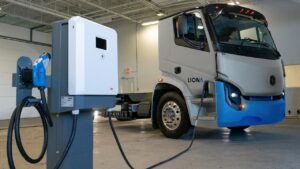
On Wednesday, the Biden-Harris administration announced $1.5 billion in federal funding to support the transition to electric freight vehicles and a national goal of a zero-emissions freight sector.
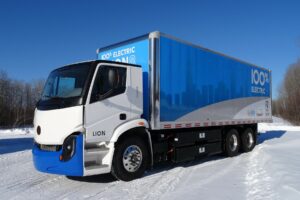
On Friday, the U.S. Environmental Protection Agency (EPA) released the long-anticipated GHG Emissions Standards for Heavy-Duty Vehicles – Phase 3 rule (HDV rule). The rule is an important step to accelerating the transition of heavy-duty vehicles in the U.S. away from oil.

On Wednesday, the U.S. Environmental Protection Agency (EPA) announced new emissions standards for light- and medium-duty vehicles. The rule is expected to lead to 31–44% battery electric vehicle (BEV) sales in 2030 and 35–56% BEV sales in 2032.

Today, the Wisconsin Senate passed Senate Bills 791 and 792, establishing a standard for Wisconsin to allow private entities to own and operate electric vehicle (EV) charging stations and charge customers by the amount of electricity used, rather than the ccharging and will allow the State to utilize the $78 million awarded to implement its National Electric Vehicle Infrastructure (NEVI) plan, bringing fast, reliable charging across Wisconsin.

Today, the Joint Office of Energy and Transportation (JOET) released the Federal Zero Emission Freight Corridor Strategy, detailing targeted areas for strategic public and private investment to build the charging network required to support the electrification of critical elements of our nation’s freight system.
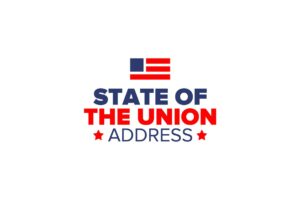
During last night’s State of the Union address, President Biden called attention to Belvidere, Ill., where an auto factory was on the verge of closing, but now a new EV battery plant will create more than 1,000 new jobs.

Today, the U.S. Environmental Protection Agency (EPA) announced they have opened the application window for $3 billion of funding through the Clean Ports Program: the Zero Emission Technology Competition and the Climate and Air Quality Planning Competition.

Today, 75 members of Climate Mayors sent a letter urging the Biden Administration to finalize the Environmental Protection Agency’s (EPA) strongest proposed rule for the GHG Emissions Standards for Heavy-Duty Vehicles – Phase 3 rule (HDV rule).
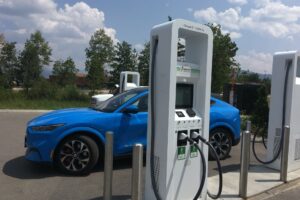
Today, the U.S. Department of the Treasury released partial guidance on the 30C Alternative Fuel Vehicle Refueling Property Credit, which provides a tax credit of up to 30% of the cost of EV charging stations.
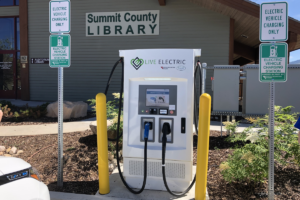
Today, the Biden administration, Department of Transportation (DOT), Department of Energy (DOE), Joint Office, and Federal Highway Administration (FHWA) announced $622 million in awards for 47 projects in 24 states and territories through the Charging and Fueling Infrastructure (CFI) Discretionary Grant Program.
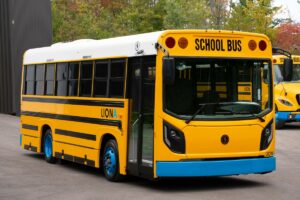
Today, the Biden-Harris administration announced more than $1 billion in grants to purchase more than 2,700 clean school buses in 37 states.

The Electrification Coalition (EC) proudly announces that Ashley Blackwell has joined the organization as its first deputy director.

Today, Ohio Governor Mike DeWine will attend a ribbon-cutting ceremony to unveil the first electric vehicle (EV) charging station funded by the Bipartisan Infrastructure Law’s National Electric Vehicle Infrastructure (NEVI) program.

Over eighty businesses recently sent a letter to the White House, urging President Biden to support the EPA’s strongest proposed greenhouse gas emissions standards for heavy-duty (HD) vehicles.

On November 15, 2021, President Joe Biden signed the Bipartisan Infrastructure Law (BIL, also known as the Infrastructure Investment and Jobs Act or IIJA).

Today, the Electrification Coalition convened policymakers and industry leaders from across Michigan for an event to advance medium- and heavy-duty (MHD) vehicle electrification.
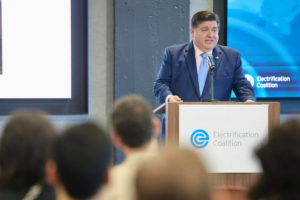
Yesterday, Governor J.B. Pritzker, Illinois State Senator David Koehler, Illinois State Representative Edgar Gonzalez and others spoke at the Electrification Coalition (EC) event that convened Illinois policymakers, nonprofit organizations, and leaders from across the electric vehicle (EV) industry to advance medium- and heavy-duty (MHD) electrification in Illinois, highlighting the importance of key policies to drive further manufacture and deployment of these vehicles in Illinois.
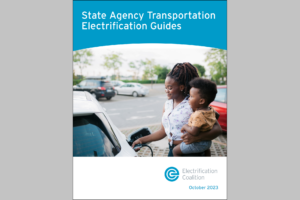
Today, the Electrification Coalition (EC) released a collection of guides detailing actions that 11 different state agencies should take to prepare for the transition to electric vehicles (EVs).

Today, the Treasury Department issued guidelines for how consumers can take advantage of the federal EV tax credit as an instant rebate at the dealership rather than receiving it as a credit when they file their taxes the following year.
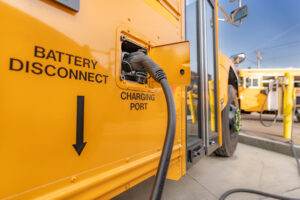
Today, the U.S. Environmental Protection Agency (EPA) announced the second rebate funding opportunity through its multi-year Clean School Bus (CSB) Program. The EPA will award up to $500 million in rebate funding under the 2023 program with the potential to adjust it based on demand and other factors.

The Pennsylvania Department of Transportation (PennDOT) announced its first round of conditional awards for National Electric Vehicle Infrastructure (NEVI) funding.

One year ago, on August 16, 2022, President Biden signed the Inflation Reduction Act (IRA), creating generational levels of investment in transportation electrification and a seismic shift in the future of transportation.

The Electrification Coalition (EC) proudly announces that Andrew Wishnia has joined its Board of Directors. Wishnia is a Partner at Cityfi and most recently served as the Deputy Assistant Secretary for Climate Policy with the U.S. Department of Transportation (USDOT) under the Biden-Harris administration.

Contact: Brianna Baker, Electrification Coalitionbbaker@electrification.org, (202) 599-8922 Lansing, Mich.—Today, Michigan Governor Gretchen Whitmer signed a $57.4 billion omnibus budget bill that includes new investments in
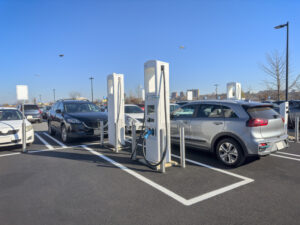
Today, seven automakers announced a joint investment of at least $1 billion to build 30,000 fast charging stations.

Contact: Noah Barnes, Electrification Coalition noah@electrification.org, (202) 461-2371 TALLAHASSEE—Last week, Florida Governor Ron DeSantis vetoed SB 284, a bipartisan bill that would have required the
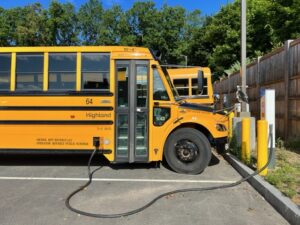
Last night, the Michigan state legislature passed a K-12 state education budget that includes $125 million for school districts to modernize their bus fleets by transitioning to clean school buses, the vast majority of which are expected to be electric.

Fourteen Georgia businesses have signed a letter, alongside businesses from states nationwide, endorsing the Environmental Protection Agency’s (EPA) proposed rule for Greenhouse Gas Emissions Standards for Heavy-Duty Vehicles-Phase 3.

Twenty-one Florida businesses have signed a letter, alongside businesses from states nationwide, endorsing the Environmental Protection Agency’s (EPA) proposed rule for Greenhouse Gas Emissions Standards for Heavy-Duty Vehicles-Phase 3.
© 2024 ELECTRIFICATION COALITION
Subscribe to our newsletter to receive information about projects, policy developments, electrification news, market insights, and more.
Amy Malaki is the Director of Partnerships and Policy at SkyNRG and SkyNRG Americas, pioneering global leaders in sustainable aviation fuel production and supply. Prior to SkyNRG, Amy was the Associate Director for the transportation portfolio at the ClimateWorks Foundation where she developed philanthropic investment strategies to advance a sustainable, equitable and low-carbon mobility system. She also pioneered the organization’s international aviation decarbonization strategy. Prior to that she focused on Asia business development at Better Place, a Silicon Valley electric vehicle network startup. She has a B.A. in Chinese and China studies from the University of Washington and an M.A. in international policy studies (energy and environment) from Stanford University.